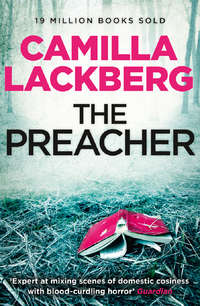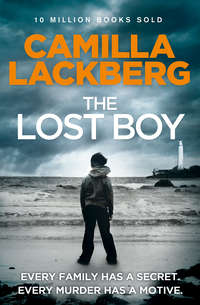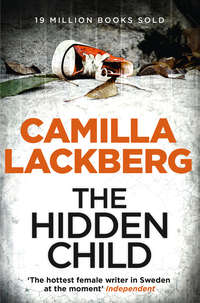
Полная версия
The Girl in the Woods
‘Most things as long as the pain is not too far gone.’
‘Both people and animals?’ asked Preben curiously.
‘Yes,’ replied Elin.
It surprised her that Britta had never mentioned this to her husband. Yet the boy Lill-Jan had heard rumours about Elin’s skills. Perhaps that was not so strange, after all. When they lived together under their father’s roof, her sister had always spoken scornfully about Elin’s grandmother and her wisdom.
‘Tell me more,’ said Preben as he headed for the door.
Elin followed reluctantly. It was not proper for her to be chatting with the master of the house in this manner, and it was all too easy for gossip to begin spreading on the farm. But Preben was the one in charge, so she had no choice but to follow him. Britta was standing outside, her arms hanging at her sides, a dark look on her face. Elin’s heart sank. This was what she had feared. He risked nothing, but she could easily land in disfavour. And Märta along with her.
Her trepidation about how it might be to live at the mercy of her younger sister had been fully realized. Britta was a stern and unkind mistress, and both she and Märta had felt the sting of her sharp tongue.
‘Elin has been helping me with Stjärna,’ said Preben, calmly meeting his wife’s eye. ‘Now she is on her way to set the dinner table for us. She suggested that we might spend some time together, you and I, since I have been away so much lately, tending to church business.’
‘Did she now?’ said Britta, still suspicious, though not quite as stern as usual. ‘Well, that was a good suggestion.’
She briskly took hold of Preben’s arm.
‘I have been missing my lord and master terribly, and I think he has been neglecting his wife of late.’
‘My dear wife is perfectly right about that,’ he replied, heading for the house along with Britta. ‘But we will now make amends. Elin said we might sit down at the table in half an hour’s time, which suits me well, as I will have time to wash and dress properly so I will not appear like a shabby ruffian next to my beautiful wife.’
‘Oh, come now, you can never look shabby,’ said Britta, slapping him on the shoulder.
Elin walked behind them, forgotten for the moment, and sighed with relief. The darkness she had glimpsed in Britta’s eyes was all too familiar. She knew her sister would not hesitate to do harm to anyone she thought had wronged her. But this time Preben had saved her and Märta, and she would remain eternally grateful to him for that, even though he should not have placed her in this situation to begin with.
She picked up her pace and hurried to the kitchen. She had only half an hour to set out the food and ask the cook to prepare something special. She smoothed her apron, feeling again the warmth of Preben’s hand.
Chapter Six

‘What are you doing, Pops?’
Bill had been so immersed in the text he was writing that he gave a start when his son spoke. He almost knocked over his cup, and some of the coffee sloshed over the side on to his desk.
He turned to look at Nils, who was standing in the doorway.
‘I’m working on a new project,’ he said, turning the computer screen so Nils could see.
‘“Nicer People”,’ read Nils aloud.
Underneath the text was a picture of a sailboat ploughing its way through the water.
‘I don’t get it.’
‘Don’t you remember that documentary we saw? The Filip and Fredrik film, Nice People?’
Nils nodded.
‘Oh, yeah. Those black guys who wanted to play bandy.’
Bill grimaced.
‘The Somalis who wanted to play bandy. Don’t call them “black guys”.’
Nils shrugged.
Bill peered at his son standing there in the dim light of the room with his hands in his pockets and his blond fringe hanging in his eyes. Nils had come along late in their lives. Unplanned and, to be honest, not particularly welcome. Gun had been forty-five when Nils was born, while he was almost fifty, and Nils’s two older brothers were in their late teens. Gun had insisted they keep the child, saying there had to be some meaning behind her pregnancy. But Bill had never developed the same connection with Nils as he had with the older boys. He hadn’t really tried. He hadn’t wanted to change nappies or sit in the sandbox or read the first-grade maths book for the third time.
Bill turned back to the computer screen.
‘This is a media presentation. My thought is to do something that will be a positive way of helping the refugees in the area become part of Swedish society.’
‘Are you going to teach them how to play bandy?’ asked Nils, his hands still in his pockets.
‘Don’t you see the sailboat?’ Bill pointed at the screen. ‘They’re going to learn to sail! And then we’ll compete in the Dannholmen regatta.’
‘The Dannholmen regatta isn’t exactly the same thing as the bandy world championship those blacks competed in,’ said Nils. ‘Not the same league at all.’
‘Don’t call them blacks!’ said Bill.
Nils was undoubtedly trying to provoke him.
‘I know the Dannholmen regatta is a significantly smaller event, but it has great symbolic importance around here, and it will attract a lot of media attention. Especially now they’re making that film here.’
Nils snorted. ‘I don’t know if they’re really refugees at all. Only people who have money can make their way up here. I read that on the Internet. And those so-called refugee kids have beards and moustaches.’
‘Nils!’
Bill looked at his son, whose face was now flushed with indignation. It was like looking at a stranger. If he didn’t know better, he’d think his son was … a racist. But that wasn’t possible. Teenagers knew so little about the ways of the world. All the more reason to promote this type of project. Most people were basically good at heart. They just needed to be educated, given a little push in the right direction. Nils would soon realize how wrong he was.
Bill heard his son leave the room and close the door behind him. Tomorrow was the start-up meeting, and he needed to have everything ready for the press. This was going to be big. Really big.
‘Hello?’ called Paula as she and Johanna came in the door with three suitcases and two prams. She was carrying the baby, balanced on her hip.
Paula smiled at Johanna as she set down the heaviest suitcase. A holiday on Cyprus with a three-year-old and an infant probably hadn’t been the smartest plan, but they’d survived.
‘I’m in the kitchen!’
Paula relaxed as soon as she heard her mother’s voice. If Rita and Bertil were home, she could leave the kids with them so she and Johanna could unpack in peace and quiet. Or else they could forget about unpacking until tomorrow and instead stretch out on the bed to watch a film until they fell asleep.
Rita gave them a smile as they came into the kitchen. There was nothing strange about her cooking in their kitchen as if it were her own. Rita and Bertil lived in the flat upstairs, but ever since the kids were born, the boundaries between the two flats had disappeared to such an extent that they might as well have installed a direct staircase from one to the other.
‘I made enchiladas. I thought you’d be hungry after the trip. How did things go?’
She reached out her arms to take Lisa.
‘Fine. Or rather, not so great,’ said Paula, gratefully handing over the baby. ‘Shoot me if I ever start talking again about how wonderful it would be to go away for a week with the kids.’
‘It was your idea,’ muttered Johanna as she tried to wake Leo, who had fallen asleep.
‘It was nuts,’ said Paula, taking a pinch of melted golden cheese from the top of one of the enchiladas. ‘Kids everywhere, grown people dressed up like cuddly toys walking around in the heat and singing some sort of battle song.’
‘I don’t think you could really call it a battle song,’ said Johanna, laughing.
‘Okay, but it was indoctrination from some kind of sect. If I’d been forced to listen to it one more time I was going to go over and strangle that big hairy bear.’
‘Tell her about the chocolate fountain,’ said Johanna.
Paula groaned.
‘Oh my God. Every night they had a buffet, specially designed for kids, so there were tons of pancakes, meatballs, pizza, and spaghetti. And a chocolate fountain. One boy made quite an impression. Everyone knew this kid’s name was Linus, because his mother ran around the whole time yelling: “No, no, Liiinus! Don’t do that, Liiinus! Stop kicking that girl, Liiinus!” Meanwhile the boy’s father was busy chugging down the beer, starting right after breakfast. And on the last day …’
Johanna couldn’t help giggling as Paula picked up a plate, helped herself to an enchilada, and sat down at the kitchen table.
‘On the last day,’ she went on, ‘Linus ran right into that huge chocolate fountain and knocked it over. There was chocolate everywhere! And he threw himself down in it and began smearing chocolate all around, while his mother jumped up and down, completely hysterical.’
She took a big bite of her food and sighed. This was the first taste of anything spicy all week.
‘Uncle Bertil?’ said Leo, starting to wake up as Johanna held him.
‘Yes, where is Bertil?’ asked Paula. ‘Has he already fallen asleep in front of the TV?’
‘No,’ said Rita. ‘He’s working.’
‘This late?’
Bertil rarely worked nights.
‘Yes, he had to go. But you’re still on maternity leave,’ said Rita, casting a hesitant look at Johanna.
She knew it hadn’t been easy to get her daughter to take time off, and Johanna was still worried that Paula might go back to work too soon. The plan was for the family to spend the whole summer together.
‘So what’s going on?’ asked Paula, putting down her knife and fork.
‘They went out to search for someone who’s gone missing.’
‘Who’s missing?’
‘A child,’ said Rita, avoiding her eye. ‘A four-year-old girl.’
She knew her daughter all too well.
‘How long has the little girl been missing?’
‘Since last night, but the parents didn’t discover she was gone until this afternoon, so the search has only been going on for a couple of hours.’
Paula cast a pleading look at Johanna, who glanced at Leo and nodded.
‘Go. They’ll need all the help they can get.’
Paula got up and gave her partner a kiss on the cheek. ‘Love you. I’ll be back soon.’ She went into the hall and pulled on a lightweight jacket. ‘Where are they?’ she asked her mother.
‘On a farm. Bertil called it the Berg farm.’
‘The Berg farm?’
Paula abruptly stopped what she was doing. She knew that farm well. And its history. And she was too much of a cynic to believe in coincidences.
Karim knocked hard on the door. He knew Adnan was inside, and he had no intention of leaving until he opened the door. The years they’d spent in a world where a knock on the door could spell death, for themselves or a family member, meant that many refugees were reluctant to open the door. Karim pounded on the door again. Finally it opened.
When he saw Adnan staring at him wide-eyed, he was almost sorry he’d knocked so hard.
‘I just talked to Rolf, and he said all of Fjällbacka is out looking for a missing girl. We need to help.’
‘A girl? A child?’
‘Yes. Rolf said she’s four years old. They think she might be lost in the woods.’
‘Of course we’ll help.’ Adnan turned to look back inside the room as he reached for his jacket. ‘Khalil, come here!’
Karim backed up a few steps.
‘We need you to help round everyone up. Tell them we’ll meet up at the kiosk. Rolf has promised to drive us there.’
‘Sure. And we’d better hurry. A little girl shouldn’t be all alone in the woods at night.’
Karim continued knocking on doors, and he heard Khalil and Adnan doing the same. After a while they’d gathered fifteen others to help out. Rolf would have to make two or three trips to get them all there, but that wasn’t a problem. He was a nice person. He wanted to help.
For a moment Karim felt uncertain. Rolf was nice, and he knew them. But how would the other Swedes react when they turned up? A bunch of roaches from the refugee centre. He knew that’s what people called them. Roaches. Or wogs. But a child was missing, and it was everyone’s responsibility to find her. It didn’t matter whether she was Swedish or Syrian. Somewhere a mother was crying in despair.
When Rolf pulled up in his car, Karim, Adnan, and Khalil were waiting along with Rashid and Farid. Karim glanced at Rashid. His children were back in Syria. Rashid met Karim’s eye. He didn’t know whether his own children were still alive, but tonight he was going to help search for a Swedish little girl.
It was blissfully quiet now the kids were in bed. Sometimes Erica felt guilty about how much she enjoyed the peace in the evenings. When Maja was little she’d joined the web forum Family Life in an attempt to find like-minded people and to get things off her chest. She thought she couldn’t be the only one who was experiencing a conflict between being a mother and needing time to herself once in a while. But she’d received such a hate-filled response when she’d honestly written about her feelings that she’d never gone back to the forum. She’d been caught off guard by the curses and insults other mothers had hurled at her, just because she didn’t love every minute she spent breastfeeding, getting up in the middle of the night, changing nappies, and listening to her baby crying. She’d been told she should not have had a child, that she was an egotistical and self-absorbed bitch because she felt the need for time on her own. Erica could still feel the anger surging inside her at the thought of those women judging her because she didn’t act and feel the same as them. Why can’t everyone do whatever is best for them? she wondered as she sat on the sofa with a glass of red wine, trying to relax in front of the TV.
Her thoughts soon turned to another mother. Nea’s mother, Eva. She could only imagine what anguish she must be feeling right now. Erica had sent Patrik a text to ask again whether she could help. She could get Kristina to come over to look after the kids. But he had told her they already had all the volunteers they needed, and she would be more useful staying at home with the children.
Erica didn’t know the Bergs, and she’d never been to their farm. Wanting to describe the setting as precisely as possible, she’d thought about going out there to have a look around and take a few pictures, but so far she hadn’t done it. There were old photographs available, so she knew exactly how the farm had looked when the Strand family lived there. Yet it was always a different experience to visit a location in person, to take in the atmosphere and get a feeling for how life on the farm must have been.
She’d enquired about the Berg family and learned they’d moved here from Uddevalla, looking for peace and quiet in the country and a good place for their daughter to grow up. Erica sincerely hoped their dream would be realized, that she’d soon get a text from Patrik saying they’d found the child in the woods, scared and lost, but alive. Yet she had a bad feeling that was not how this would end.
She swirled the red wine in her glass. She’d treated herself to a good Amarone in spite of the oppressive evening heat. Most people drank chilled rosé wines in the summer, or white wine served with ice cubes. But she didn’t care for either white or rosé wines. She preferred sparkling wines or intense red wines, no matter what the season. That said, she couldn’t tell the difference between an expensive champagne and a cheap Spanish cava, so as Patrik liked to joke, she was a cheap date.
She felt guilty, sitting in comfort and drinking wine when a four-year-old girl, in the best-case scenario, was lost in the woods. But that was how her mind worked. It was too awful to dwell on all the bad things that might happen to a child, so she subconsciously turned her thoughts to something banal and meaningless. That was a luxury Nea’s mother couldn’t afford at the moment. She and her husband had found themselves caught in a living nightmare.
Erica straightened up and set her wine glass on the coffee table. She reached for her notebook. Over the years she’d got in the habit of always having paper and pen nearby. She liked to jot down whatever thoughts and ideas popped into her head, and she made lists of things she needed to do in order to move forward with her book. That was what she wanted to do now. All her instincts told her that Nea’s disappearance was somehow connected to Stella’s death. She’d spent the past few weeks loafing. Summertime laziness and sunshine had taken over, and she hadn’t made the sort of progress she’d hoped with her book. Now she was going to set her mind to it. That way, if the worst happened, she might be able to offer help, based on what she’d learned about the previous case. Maybe she could find the link that she was sure existed.
Erica glanced at her mobile. Still no word from Patrik. Then she began feverishly jotting down notes.
THE STELLA CASE
She knew even before they reached her. The heavy footsteps. Their eyes fixed on the ground. They didn’t have to say a word.
‘Anders!’ she screamed, and her voice was so shrill.
He came rushing out of the house, but stopped abruptly when he saw the police officers.
He fell to his knees on the gravel. Linda rushed over to him, put her arms around him. Anders had always been so big and strong, but right now she was the one who had to keep them both going.
‘Pappa? Mamma?’
Sanna stood in the doorway. The light from the kitchen lit up her blond hair like a halo.
‘Did they find Stella, Mamma?’
Linda couldn’t meet her daughter’s eye. She turned towards one of the officers. He nodded.
‘We’ve found your daughter. I’m afraid she’s … she’s dead. We’re so sorry.’
He stared down at his shoes and swallowed hard to hold back the tears. He was as pale as a ghost, and Linda wondered whether he’d seen Stella. Seen the body.
‘But how can she be dead? That can’t be true. Mamma? Pappa?’
She heard Sanna’s voice behind her, rattling off questions. But Linda had no answers to give her. Nor any solace to offer. She knew she ought to let go of Anders and take her daughter in her arms. But only Anders understood the pain she now felt in every fibre of her body.
‘We want to see her,’ she said, finally making herself raise her head from Anders’s shoulder. ‘We have to see our daughter.’
The taller of the two officers cleared his throat.
‘And you will. But first we have to do our job. We have to find out who did this.’
‘What do you mean? It was an accident, surely?’
Anders pulled away from Linda and stood up.
The tall policeman quietly replied.
‘I’m afraid this was no accident. Your daughter was murdered.’
The ground suddenly rose up towards Linda. She didn’t even have time to be surprised before everything went black.
Chapter Seven

Only twenty more to go.
James Jensen was hardly out of breath as he did the next push-up. The same routine every morning, in summer as well as winter. On Christmas Eve and on Midsummer Eve. These sorts of things had meaning. Routines had meaning. Consistency. Order.
Ten left.
Helen’s father had understood the meaning of routines. James still missed KG, although the feeling was a form of weakness he normally didn’t allow himself. KG had suffered a heart attack almost ten years ago, and no one had ever been able to take his place.
The last one. James got up after his hundred push-ups. A long life spent in the military had taught him the value of being in top physical condition.
James glanced at his watch: 08.01. He was behind schedule. When he was home he always had breakfast at eight o’clock sharp.
‘Breakfast is ready!’ called Helen, as if she’d read his mind.
James frowned. The fact she was calling him meant she’d noticed he was late.
He used a towel to dry off the sweat, then left the deck and went into the living room. The kitchen was right next door, and he could smell bacon cooking. He always ate the same breakfast. Scrambled eggs and bacon.
‘Where’s Sam?’ he asked as he sat down and started in on the eggs.
‘He’s still sleeping,’ said Helen as she served him the bacon, which was perfectly crisp.
‘It’s eight o’clock and he’s still asleep?’
Annoyance crept over him, as it always did when he thought about Sam. Sleeping past eight in the morning? He’d always been up by six in the summertime, and then he’d worked until late in the evening.
‘Go wake him,’ he said, taking a swig of coffee, but the next instant he spat it out. ‘What the hell? No milk?’
‘Oh, sorry,’ said Helen, taking the cup from his hand.
She poured the coffee into the sink, refilled it, and added a dash of whole milk.
Now it tasted the way it should.
Helen hurried out of the kitchen. He could hear her rushing up the stairs, followed by a murmur of voices.
His annoyance returned. The same annoyance he felt when he was deployed with a unit and one or more of the soldiers tried to downplay or avoid situations out of fear. He couldn’t understand that kind of behaviour. If a man chose to join the military, especially in a country like Sweden where it was completely voluntary to deploy to a war zone in another country, then he should do the job he’d been assigned. Fear was something you left at home.
‘Where’s the fire?’ grumbled Sam as he came sauntering into the kitchen, his black hair standing on end. ‘Why do I have to get up at this hour of the morning?’
James clenched his fists under the table.
‘In this house we don’t sleep away the day,’ he said.
‘But I couldn’t find a summer job, so what the hell am I supposed to do?’
‘No swearing!’
Both Helen and Sam flinched. For a moment anger made everything go black before his eyes, and James forced himself to take several deep breaths. He had to maintain control, both over himself and over his family.
‘At nine hundred hours we’ll meet out back for target practice.’
‘Okay,’ said Sam, looking down at the table.
Behind him Helen was still cringing.
They’d been walking all night. Harald was so tired he could hardly see straight, but he had no intention of going home. That would mean giving up. Whenever the fatigue got the better of him, he’d returned to the farm for a short break to warm up and drink some coffee. Each time he’d found Eva Berg sitting mutely in the kitchen, her face grey with worry. That was enough for him to go back out to rejoin the search party.
He wondered whether the others knew who he was. And what role he’d played thirty years ago. He was the one who had found the other little girl. People who had lived in Fjällbacka back then knew about it, of course, but he didn’t think Eva and Peter did. At least, he hoped not.
When they were assigned search areas, he had deliberately chosen the area with the lake where he’d found Stella. And that was the first place he’d gone to search. The small lake had dried up long ago, leaving behind only a patch of wooded land. But the old tree trunk was still there. The huge tree had clearly withstood a good deal of wind and weather, and it looked more brittle and drier than thirty years earlier. But he found no little girl lying there. He caught himself heaving a sigh of relief.
The search party had regrouped several times during the night. Some people had gone home to get a few hours’ sleep, then come back and joined different groups. New volunteers had also arrived as the summer night gave way to morning. Those who had not gone home to rest included the men and boys from the refugee centre. Harald had chatted with them as they searched. They spoke in halting Swedish while he tried out his halting English. But somehow they’d managed to communicate.









